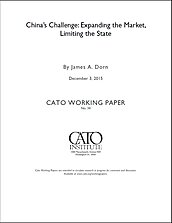This article explores the tension between the state and the market in China, the challenges that remain in moving toward what Milton Freidman called “free private markets,” and the importance of drawing on China’s ancient culture to understand the importance of freedom and limited government in promoting economic and social harmony.
China’s leaders consistently invoke classical Chinese philosophy as validation for the authoritarian aspects of the modern Chinese state. These leaders often argue that freedom and liberalism are Western ideologies, and that calls for increased freedom and liberalization in China are an undue form of cultural imperialism and a Western attempt to undermine Chinese sovereignty and prosperity. In reality, the idea that Eastern philosophy uniformly supports top-down imposed order is a political creation of the Chinese Communist Party designed to justify its authoritarian power.
The CCP relies on a cherry-picked reading of classical Chinese writers. A more holistic review demonstrates the presence and importance of ideas we would now classify as liberal (in the classical sense of the word). These writings show that free markets, private property, and laissez faire are not a modern, Western ideology, but a universal reflection of an innate human desire for freedom.

